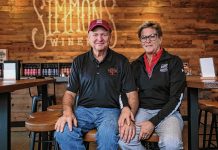A Central Middle School student with a penchant for adventure has overcome slim odds and is walking after becoming paralyzed in an accident.
Alex Kingsbury, 14, is working on physical therapy, strength training and regaining about 25 pounds at his southern Bartholomew County home, and has returned to school.
After the accident last fall, he spent about a month and a half at Riley Hospital for Children at Indiana University Health in Indianapolis. Alex was in the intensive care unit following surgery, and then in rehabilitation where he learned to walk again after suffering a neck injury so severe that he was described as paraplegic when he arrived at the hospital.
The Riley pediatric neurosurgeon, doctors, nurses and physical therapists don’t use words like miracle when describing the teen’s recovery, his father Aaron Kingsbury said.
[sc:text-divider text-divider-title=”Story continues below gallery” ]
Click here to purchase photos from this galleryBut his family believes there is some sense of mystery how or why Alex has recovered to the point of walking on his own after shattering the C6 vertebrae in his neck, causing the full-paralysis diagnosis when Alex arrived at Riley by LifeLine Helicopter on Oct. 1.
The Kingsbury family only recently learned that the initial prognosis for Alex was a 10 percent chance of walking again.
What happened
The first Sunday in October started out as a normal day. The Kingsbury family was visiting church friends in the Grandview Lake area. The property includes a nearby wooded area, where Alex and his brother Joe, 13, liked to play around.
Some of that activity included tree parachuting, something Alex and his friends liked to do. You find a tall, willowy tree, climb it and then let the tree bend to carry the climber back to the ground, which Alex said he had done 20 to 25 times before.
But on this day, Alex’s choice of tree led to a catastrophic accident.
Alex spotted and began to climb a 20-foot tree. Noticing it was lodged on another tree, he freed it in order to get higher and then to parachute down. But the tree snapped, causing Alex to plummet at least 15 feet to the ground, he said.
He landed, stunned, but realized he couldn’t move, alarming the property owner and his brother Joe who were nearby.
The property owner rushed back to the house where Alex’s parents, Aaron and Mindy, were informed of what happened — and a 911 call was made.
Southwestern Volunteer Fire Department firefighters arrived first and carefully placed Alex on a backboard and in a neck brace, following every procedure that needed to be performed perfectly to keep Alex stable on the medical helicopter transport to Indianapolis, Mindy Kingsbury said. The decision to fly Alex from the scene rather than transport by ambulance was another critically important decision, she said.
On the drive to the hospital, his parents contemplated what Alex could be facing and considered what they had heard that morning during the sermon in church.
“We weren’t terrified,” Aaron Kingsbury said. “The sermon was about the life of Job, who had everything and then had it taken away, and his response was, ‘God is so good.’ The takeaway from that is how will you respond when tragedy happens to you?”
Their response was to acknowledge that Alex was not in control, the family was not in control, and they needed to trust that God was in control of Alex’s situation.
Doctor’s assessment
Dr. Jeffrey Raskin, a Riley pediatric neurosurgeon, was notified that Alex was arriving at the emergency room, and with his team determined the teen needed immediate surgery.
Alex had suffered an incomplete spinal and neck injury, an unstable fracture of a vertebrae that needed to be repaired quickly if the teen would have any chance of walking again, the doctor said.
“If it had been complete, the spinal cord would have been severed, which could result in full paralysis that couldn’t be reversed, or death,” his mother said.
But since Alex’s injury was classified as incomplete, with immediate neurosurgery he might have a chance to improve his outcome, Raskin said.
Neck injuries are classified by a ASIA Impairment Scale that goes from Class A as the most serious impairment, which is no motor or sensory function, to Class E, which is normal function.
“He (Alex) had a ‘B’ — the second worst,” Raskin said. “If you are a ‘B’ in the first exam, and 72 hours later, you are at the same classification, you have a very low chance of walking again.”
Although Alex was feeling intense pain, he could not move his arms or legs. As the pediatric neurosurgery team assembled, they prepared him for surgery by first doing a scan to determine how extensive the neck injury was.
His father remembers Alex asking that if he had to have any shots, he wanted to be asleep when that happened. And he asked his family to make sure that whatever happened, he would be able to play in a football game that was a few days away.
Raskin told the Kingsbury family that the C6 vertebrae in Alex’s neck was squashed down and had burst toward Alex’s esophagus, but didn’t injure his esophagus.
Instead, the vertabrae burst out backward into Alex’s spinal cord, causing devastating damage that could have paralyzed the teenager permanently, Raskin said.
During surgery that lasted more than four hours, Raskin did a corpectomy and fusion through an incision in the front of Alex’s neck, moving the trachea and esophagus to the side and taking out the bone fragments and discs, Riley officials said. He then put in a tibia allograft, a piece of tibia from a cadaver, to replace the bone that had shattered, and then screwed in a metal plate.
The extent of Alex’s injury meant he had landed on his head during the accident, and the rest of his body put extensive pressure on his C6 neck vertebrae, which is only designed to support his head and neck, not his entire body, Raskin said.
In addition to the neck surgery, Alex had broken his wrist, which was set in a cast.
Watching for signals
Alex’s parents began the waiting game with the teen in intensive care. They were looking for movement, any movement from their son, that would indicate he wasn’t paralyzed.
Within 24 hours after the surgery, a glimpse of hope emerged when Alex made a deliberate small movement in his right big toe.
When that happened, Raskin said the team became optimistic as it indicated Alex’s brain was sending signals from his spinal cord through his body.
“If someone has movement within the first 48 hours, the chance of being able to eventually walk goes all the way up to 30 percent,” Alex said.
But at the time, the teen didn’t know about that percentage possibility.
Alex was determined that he was going to walk again, something he never wavered about during his month-and-a-half hospital stay.
Every morning, Riley staff would pinch, prod and nudge different parts of Alex’s body, urging him to try to move other body parts and reassuring him that each day, his body was doing more work to reconnect his brain to his spinal cord.
After two weeks in intensive care, Alex was moved to the rehabilitation unit, where the hard work to restore physical ability began in earnest.
More movement returns
Alex said the therapy initially was frustrating, particularly the inability to walk, but he started with moving his hands, touching fingers to thumb, feeling movement return through his chest and arms and gradually moving into his legs.
The family created a “Team Alex” mantra and reminded him, as his therapists did, that every day was a chance to see just how far Alex could go.
“I would say ‘Show me how you can move your thumb,’ and he would say, ‘Look what else I can do.’ He definitely has the spirit of overcoming this.“
— Dr. Jeffrey Raskin, a Riley Hospital for Children pediatric neurosurgeon, on Alex Kingsbury’s will to recover from paralysis
In the meantime, friends from the couple’s church, Terrace Lake Community Church, took over caring for the couple’s other children — Joe, 16-year-old Lea and 2-year-old Graham. They stocked the freezer with food and provided ongoing child care for the toddler. Central football teammates visited for encouragement.
Alex received a special visit from husband-and-wife country music entertainers Garth Brooks and Trisha Yearwood at the dedication of an interior playground at the hospital, meeting the world-famous singers in his wheelchair.
Alex said he didn’t know who the pair were, but was told later that Brooks has his own Sirius XM station. With that information, he concluded that the singer was a big deal.
Setting goals
The work in rehab was tough and tiring, but therapists were persistent, saying “Show us what you can do” and “How much are you going to show us today?”
A Riley staffer brought in Alex’s school work, which he also completed during his hospital stay. But everything wasn’t all-business all the time.
He played around a little with a three-wheeled bike at Riley, although worrying his parents when he motored a little too fast in the hallways.
Alex said his main motivation was simply to get out of the hospital quickly and go home, and walking as soon as possible.
That day came Nov. 14.
Raskin said he was in surgery when Alex walked out of the hospital after just over a month and a half of treatment, but staff members took video so he could watch it later.
“He progressed very quickly,” the neurosurgeon said of Alex’s recovery. “That’s really kind of unbelievable. It underscores the type and intensive work of rehab at Riley. And his sheer will. I would say ‘Show me how you can move your thumb,’ and he would say, ‘Look what else I can do.’ He definitely has the spirit of overcoming this.”
Although Mindy Kingsbury had consulted with hospital officials about modifying the house for Alex to use a wheelchair when he got home, Alex told her not to bother. He would walk and modifications would not be needed.
Back home
Alex wore a neck brace for about 12 weeks after his hospital release, returning to school after Thanksgiving break. There, he used a wheelchair at first because of the long walks between classes, but continued to practice walking short distances.
At home, he would occasionally surprise his parents by getting up and walking across the room unexpectedly, just to show them he could do it.
As Alex progressed, Mindy said she never cried while she watched her son struggle to first walk along parallel bars, then with a walker, then with a cane, and finally on his own.
“But later, I would just weep,” she said.
After taking about a year off from sports, Alex said he is considering returning to the football team with medical approval. He is doing some strength training with the Columbus East football team, wanting to play for the Olympians someday.
Raskin said Alex will need to be particularly careful to avoid high-impact sports or other activities that could re-injure the neck area. Becoming a kicker on the football team might be a possibility, but it is up to the family to decide based on the risk factors, he said.
As for the future, Alex said he might like to become a police officer. He is also considering a military career.
Meanwhile, physical therapy continues and Alex will need to check in with the Riley medical team for at least a couple years, the neurosurgeon said.
Raskin said it’s incredibly rewarding to see Alex progressing so well with his return to mobility.
“These are the wins that get you through the losses of kids who don’t make it,” Raskin said. “I’ve done a couple hundred of these (surgeries) and Alex is definitely one of the best as far as recovery.”
Family life also is returning to a far more normal pace, Mindy Kingsbury said, although a new rule for Alex and his siblings is there will be no more tree parachuting — ever.
Smiling at Alex, Aaron Kingsbury admits as a father that it’s hard to tell their teenage son not to climb a tree.
Aaron Kingsbury said he didn’t know why his son was able to walk again, when others could not.
“They say certain factors work in your favor — if you’re young, athletic, strong family presence, a strong will,” he said. “But I think there’s another piece. No one has really described this as a miracle, but it is a miracle in that it is God’s work in Alex’s life. That’s the piece of it that none of us could control. We are thankful to God for bringing us this far.”
Learn more about Riley Hospital for Children
To learn more about Riley Hospital for Children in Indianapolis, visit rileychildrens.org/.
About Alex Kingsbury’s injury
Alex Kingsbury, 14, Columbus, suffered a burst C6 vertebrae in his neck after falling while attempting to parachute on a tree in rural Bartholomew County on Oct. 1, resulting in paralysis.
Pediatric neurosurgeon Dr. Jeffrey Raskin performed a corpectomy and fusion through the front of Alex’s neck, with a small incision. Moving the teen’s trachea and esophagus to the side, he pulled out bone fragments and discus and put in a tibia allograft, which is a piece of tibia from a cadaver, to replace the C6 bone segment that had shattered in his neck. A metal plate and screws were put in to further stabalize the repair.
Within hours, Kingsbury was able to move his big toe, a sign that the surgery was successful. Within a month, he was walking and was able to walk out of Riley on his own with his family.
He is returning for a checkup with Raskin at Riley on Tuesday.





